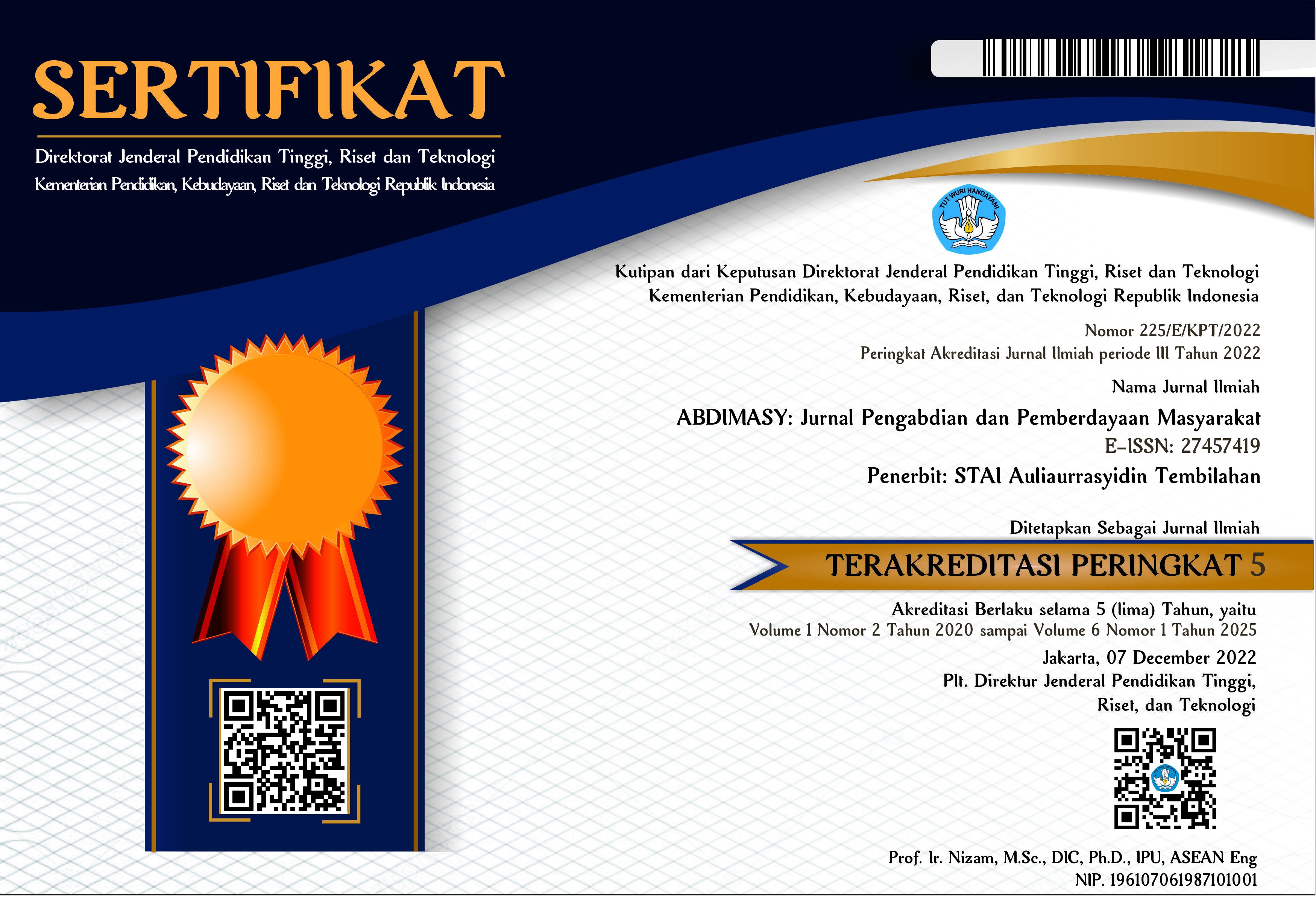Zero Waste: Mewujudkan Masa Depan Ramah Lingkungan bagi Masyarakat Desa Jongkong
DOI:
https://doi.org/10.46963/ams.v5i1.1859Keywords:
Zero Waste, Environment, SocietyAbstract
Waste is a significant issue in society, both in Indonesia and globally. The primary challenges are the availability of landfills and the awareness of residents. Jongkong Pasar Village in Kapuas Hulu Regency, West Kalimantan Province, faces similar issues. Consequently, a Zero Waste-themed community service program was implemented to enhance residents' awareness in managing household waste, particularly plastic. This activity took place in January 2024 utilizing the counseling method. As a result, residents' understanding of waste management improved through the implementation of zero waste practices. This fosters great hope that those who were not present will emulate the actions of the participants. Consequently, the waste problem in Jongkong Pasar Village can be addressed promptly.
Downloads
References
Astutik, R. P., Septian, P. D., Andini, I. N., Fitriya, N. I., & Radianto, D. O. (2024). Pengembangan Teknologi Ramah Lingkungan Untuk Pengolahan Limbah Padat Menuju Produksi Bebas Limbah. Rumpun Ilmu Teknik, 2(2), 83–96.
Badan Pusat Statistik Kabupaten Kapuas Hulu. (2021). Kecamatan Jongkong dalam Angka 2021. Kapuas Hulu: CV. Riz’Q.
Bogusz, M., Matysik‐pejas, R., Krasnodębski, A., & Dziekański, P. (2021). The concept of zero waste in the context of supporting environmental protection by consumers. Energies, 14(18), 1–22. https://doi.org/10.3390/en14185964
Daq, M. F., & Suryadharma, P. (2020). Analisis Pengelolaan Sampah dan Willingness To Pay (WTP) Masyarakat di Desa Purwasari. Jurnal Pusat Inovasi Masyarakat (PIM), 2(5), 754‒762.
Fazri, A., Darmawan, D., Iskandar, A., Zuhri, A., Amri, S., & Syam, F. (2023). Sosialisasi Lingkungan Sehat Bebas dari Sampah dan Vektor Penyakit dengan Konsep Pemberdayaan Masyarakat. Lok Seva: Journal of Contemporary Community Service, 2(1), 45–53. https://doi.org/10.35308/lokseva.v2i1.6443
Jakiyudin, A. H., Husain, N. A., & Yusuf, M. (2022). Kampanye Zero Waste Melalui Noken Dalam Mendukung Pencapaian Sdgs 2030. PROSIDING SEMINAR NASIONAL UNIVERSITAS PGRI PALANGKA RAYA, 1, 283–296.
Jati, P., Program, L., Kimia, S. P., Tarbiyah, I., & Keguruan, D. (2020). Pemanfaatan Limbah Minyak Goreng Sebagai Sabun Cuci Rumah Tangga Di Lempuing Jaya. Jurnal Pengabdian Kepada Masyarakat, 17(1), 49–57.
Kusumawati Indra, D. N., Kusumah, W. I., & Wibisono, W. (2022). Konsep Pemaknaan Desain Rupa Sebagai Daya Tarik Konsumen Pada Kriya Kalung Kreasi Motif Tradisional Berbahan Limbah Plastik Tebal Bagi Pengembangan Pelaku Seni Dan Umkm Dalam Menghadapi Pandemi Covid-19. Prosiding Seminar Nasional Manajemen, Desain & Aplikasi Bisnis Teknologi (SENADA), 5(1), 53–63.
Melvianawati, L., Khoiriyah, A., & Permana, D. (2022). Penerapan Teknologi Pengolahan Limbah Minyak Goreng Menjadi Sabun Melalui Konsep Produk Ramah Lingkungan di Desa Mlajah , Kecamatan Bangkalan. Journal of Economic Community Service, 1(2), 1–7.
Mulijanti, S. L., & Tedy, S. (2019). Suatu Kasus pada Peternak Sapi Perah di Desa Mekar Bakti Kecamatan Pamulihan Kabupaten Sumedang. Prosiding Seminar Nasional Hasil Penelitian Agribisnis VI, 6(1), 326–331.
Pratama, Y. F., Sekarningrum, B., & Yunita, D. (2024). Modal Sosial Masyarakat dalam Mengatasi Limbah Minyak Jelantah melalui Program Tersenyum. 10(1), 56–70.
Putra, E., Nurhasanah, Siregar, N. A., & Siregar, J. A. (2022). Pengenalan Gaya Hidup Zero Waste Terhadap Siswa Sekolah Dasar. Jurnal ADAM: Jurnal Pengabdian Masyarakat, 1(2), 225–231.
Putri, K. S. B., & Kalaloi, A. F. (2023). Pengaruh Kampanye #Tukarbaju Terhadap Penerapan Zero Waste Fashion Dalam Upaya Pemanfaatan Limbah Pakaian. eProceedings of Management, 10(4), 2947–2957.
Ratnawati, S. (2020). Processing of Plastic Waste Into Alternative Fuels in The Form of Grounded (Pertalastic) Through Pirolysis Process in Science Laboratory of MTsN 3 West Aceh. Indonesian Journal of Chemical Science and Technology (IJCST), 3(1), 8–16.
Rustan, K., Agustang, A., & Idrus, I. (2023). Penerapan Gaya Hidup Zero Waste Sebagai Upaya Penyelamatan Lingkungan di Indonesia. SIBATIK JOURNAL: Jurnal Ilmiah Bidang Sosial, Ekonomi, Budaya, Teknologi, dan Pendidikan, 2(6), 1763–1768.
Utami, A. P., Pane, N. N. A., & Hasibuan, A. (2023). Analisis Dampak Limbah/Sampah Rumah Tangga Terhadap Pencemaran Lingkungan Hidup. Cross-border, 6(2), 1107–1112.
Widjaja, G., & Gunawan, S. L. (2022). Dampak Sampah Limbah Rumah Tangga Terhadap. Journal of Health and Medical Research, 2(4), 266–275.
Zaman, A., & Newman, P. (2021). Plastics: Are they part of the zero-waste agenda or the toxic-waste agenda? Sustainable Earth, 4(1), 1–16. https://doi.org/10.1186/s42055-021-00043-8
Zuraidah, Z., Rosyidah, L., & Zulfi, R. (2022). Edukasi Pengelolaan dan Pemanfaatan Sampah Anorganik di Mi Al Munir Desa Gadungan Kecamatan Puncu Kabupaten Kediri. BUDIMAS: JURNAL PENGABDIAN MASYARAKAT, 4(2), 1–6.
Zurhainun, M., Ain, U. S., Alfanisah, N., Sya’rani, I., Suryani, L., Rahman, Sulaimiah. (2023). Pembuatan Biogas Dan Pupuk Kompos Dengan Memanfaatkan Limbah. Jurnal Pendidikan dan Pengabdian Masyarakat, 6(1), 71–76.
Downloads
Published
Issue
Section
License
Copyright (c) 2024 Yohana Triana Ina Weran, Burhanudin Rais, Mikha Mikha

This work is licensed under a Creative Commons Attribution-ShareAlike 4.0 International License.
Authors who publish with this journal agree to the following terms:
1. Copyright on any article is retained by the author(s).
2. The author grants the journal, right of first publication with the work simultaneously licensed under a Creative Commons Attribution shareAlike 4.0 International License that allows others to share the work with an acknowledgment of the work’s authorship and initial publication in this journal.
3. Authors are able to enter into separate, additional contractual arrangements for the non-exclusive distribution of the journal’s published version of the work (e.g., post it to an institutional repository or publish it in a book), with an acknowledgment of its initial publication in this journal.
4. Authors are permitted and encouraged to post their work online (e.g., in institutional repositories or on their website) prior to and during the submission process, as it can lead to productive exchanges, as well as earlier and greater citation of published work.
5. The article and any associated published material is distributed under the Creative Commons Attribution-ShareAlike 4.0 International License





2.png)



